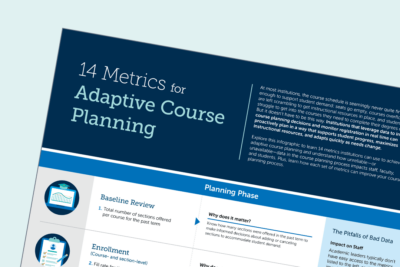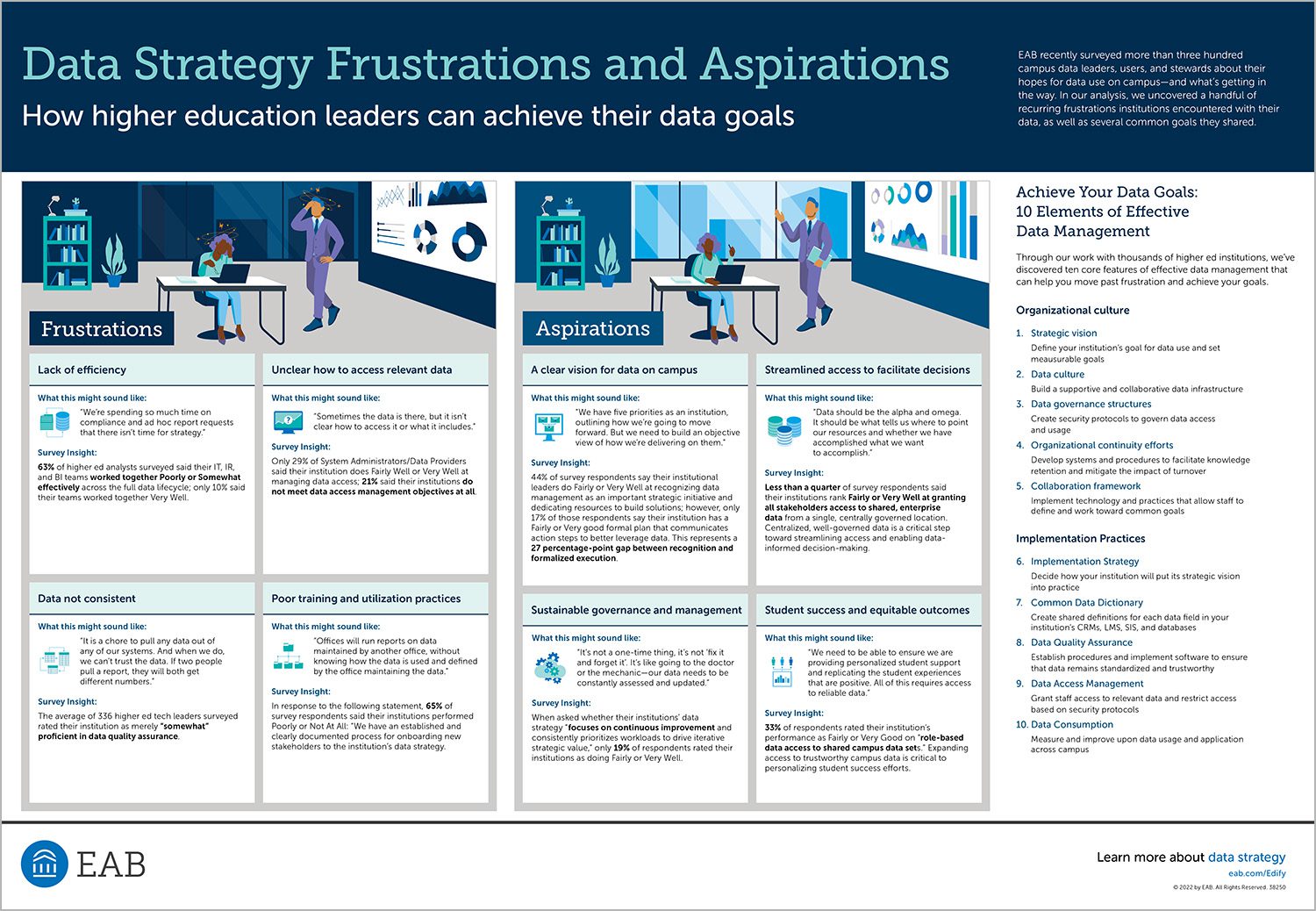- Resources /
- All /
- Infographic /
Higher Ed Data Strategy: Frustrations and Aspirations
How campus leaders can achieve their data goals
Experts from EAB’s Edify team recently surveyed more than 300 campus data leaders, users, and stewards about their hopes for data use on campus—and what’s getting in the way. In our analysis, we uncovered a handful of recurring frustrations schools encountered with their data, as well as several common goals they shared.
Explore the most common frustrations and aspirations we heard, and click to see more about how these play out on campus.
Frustrations
Lack of efficiency
What this may sound like:
- “We’re spending so much time on compliance and ad hoc report requests that there isn’t time for strategy.”
- “My staff is too bogged down with just pure data entry, updating and manipulating data, checking and rechecking. We’re not getting a good return on investment because of all this manual work required.”
Data not consistent
What this might sound like:
- “It is a chore to pull any data out of any of our systems. And when we do, we can’t trust the data. If two people pull a report, they will both get different numbers.”
- “A lot of people jump to blame our ERP, but 95% of the issues people have in our ERP stem from the business processes that were set up to support it.”
Unclear how to access relevant data
What this might sound like:
- “Sometimes the data is there, but it isn’t clear how to access it or what it includes.”
- “There are things that we’ve been struggling to figure out how to solve that if we had access to data, we’d suddenly see what the solution should be. Absent that, we can’t even really conceive of it, it’s like you don’t know what you don’t know.”
Poor training and utilization practices
What this might sound like:
- “Offices will run reports on data maintained by another office, without knowing how the data is used and defined by the office maintaining the data.”
- “We need data and staff to interpret the data. Void of data and staff that can interpret it means decisions get made without data.”
Aspirations
A clear vision for data on campus
What this might sound like:
- “There is going to be a culture shift that needs to be made… it will be seen as positive if messaged correctly.”
- “We have five priorities as an institution, outlining how we’re going to move forward. But we need to build an objective view of how we’re delivering on them.”
Sustainable governance and management
What this might sound like:
- “We need to invest in making sure that people see ongoing data maintenance as a requirement. It’s not a one-time thing, it’s not ‘fix it and forget it’. It’s like going to the doctor or the mechanic—our data needs to be constantly assessed and updated.”
- “We need to create a centralized system for data management.”
Streamlined access to facilitate decisions
What this might sound like:
- ”We truly want to make data-informed decisions—and we need to free the data at all levels and create more transparency and accountability.”
- “Data should be the alpha and omega. It should be what tells us where to point our resources and whether we have accomplished what we want to accomplish.”
Student success and equitable outcomes
What this might sound like:
- “We need to be able to ensure we are providing personalized student support and replicating the student experiences that are positive. All of this requires access to reliable data.”
- “Our ability to disaggregate data will be extremely important in our equity work and determining where we’re doing well and where we aren’t. We need data at our fingertips for daily decision-making if we want to move the needle on equity and student success.”
Achieve Your Data Goals:
10 Elements of Effective Data Management
Through our work with hundreds of higher ed institutions, we’ve discovered ten core features of effective data management that can help you overcome frustration and achieve your goals.
Organizational Culture
1. Strategic Vision
Define your institution’s goal for data use and set measurable goals
2. Data Culture
Build a supportive and collaborative data infrastructure
3. Data Governance Structures
Create security protocols to govern data access and usage
4. Organizational Continuity Efforts
Develop systems and procedures to facilitate knowledge retention and mitigate the impact of turnover
5. Collaboration Framework
Implement technology and practices that allow staff to define and work toward common goals
Implementation Practices
6. Implementation Strategy
Decide how your institution will put its strategic vision into practice
7. Common Data Dictionary
Create shared definitions for each data field in your institution’s CRMs, LMS, SIS, and databases
8. Data Quality Assurance
Establish procedures and implement software to ensure that data remains standardized and trustworthy
9. Data Access Management
Grant staff access to relevant data and restrict access based on security protocols
10. Data Consumption
Measure and improve upon data usage and application across campus
More Resources

APS Toolkits

